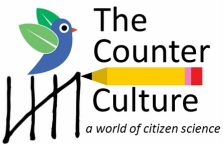Eco-Social Resilience through models of Public Participation in Scientific Research
As the need for
and interest in participatory approaches to science and management continue to
increase around the globe, we have opened a special feature in Ecology & Society to facilitate a multidisciplinary
discussion of the concrete impacts of different styles of public engagement in
research. If you would like to contribute to this advancing the discussion, then we invite you to submit a research paper, review/synthesis, or case study.
We use the term Public Participation in Scientific Research (PPSR) to include a range of activities including but not limited to citizen science, community-based monitoring, participatory biodiversity, community-based participatory research, participatory mapping, do-it-yourself science, and volunteer water quality monitoring. The myriad of names reflect the emergence of PPSR independently within multiple disciplinary silos.
Ecology & Society already features research related to collaborative adaptive management, which is one form of PPSR known to contribute to resilience. Within PPSR, there are other permutations for which their outcomes and impacts have not yet been well documented or explored. Within each style of PPSR, there are approaches and concepts that could be applied to other styles of PPSR but have never been examined or evaluated for that transfer.
PPSR projects can be classified as contributory, collaborative, and co-created, and these vary across a spectrum in offering opportunities to participants in the level and quality of their involvement. The design and implementation of projects involving PPSR is inherently a multidisciplinary endeavor, and may include ecologists, educators, natural resource managers, sociologists, evaluators, programmers, economists, specialists in human-computer interactions and user-centered design, and more. Similarly, the outcomes and impacts are leveraged by multiple disciplines, particularly those disciplines focused on ecological resilience and sustainability. PPSR produces outcomes that advance scientific knowledge, spur change in social-ecological systems, and manifest from interactions among the values, motives, and lives of individuals who participate. PPSR may affect knowledge creation, policy, planning, management practices, education, individual participants and communities.
We are putting out the call to the PPSR field to document the presence (or absence) of eco-social resilience, or its components, as a product of particular components (designed or emergent) within different styles of PPSR projects. We want to challenge the PPSR field to improve the effectiveness of PPSR by identifying which principles and rules of thumb are universally applicable and which are restricted to a particular PPSR model. By the conclusion of the Special Feature, we intend for the future research priorities and PPSR designs to be clear and a larger extended community built around the shared practices. Contributions will expose a greater diversity and complexity of possible outcomes, their pathways toward resilience, and the particular attributes of resilience, with processes operating at different but mutually reinforcing scales.
Given the transdisciplinary nature of PPSR, the outcomes span the realms of economics, policy, culture, ecology, conservation, education, institutional capacity, and management. For these reasons, contributions in the special feature will provide both theoretical and practical lessons from projects with impacts related to varied attributes of socio-ecological resilience such as diversity, memory, redundancy, short feedback loops, self organization, and social capital.
We use the term Public Participation in Scientific Research (PPSR) to include a range of activities including but not limited to citizen science, community-based monitoring, participatory biodiversity, community-based participatory research, participatory mapping, do-it-yourself science, and volunteer water quality monitoring. The myriad of names reflect the emergence of PPSR independently within multiple disciplinary silos.
Ecology & Society already features research related to collaborative adaptive management, which is one form of PPSR known to contribute to resilience. Within PPSR, there are other permutations for which their outcomes and impacts have not yet been well documented or explored. Within each style of PPSR, there are approaches and concepts that could be applied to other styles of PPSR but have never been examined or evaluated for that transfer.
PPSR projects can be classified as contributory, collaborative, and co-created, and these vary across a spectrum in offering opportunities to participants in the level and quality of their involvement. The design and implementation of projects involving PPSR is inherently a multidisciplinary endeavor, and may include ecologists, educators, natural resource managers, sociologists, evaluators, programmers, economists, specialists in human-computer interactions and user-centered design, and more. Similarly, the outcomes and impacts are leveraged by multiple disciplines, particularly those disciplines focused on ecological resilience and sustainability. PPSR produces outcomes that advance scientific knowledge, spur change in social-ecological systems, and manifest from interactions among the values, motives, and lives of individuals who participate. PPSR may affect knowledge creation, policy, planning, management practices, education, individual participants and communities.
We are putting out the call to the PPSR field to document the presence (or absence) of eco-social resilience, or its components, as a product of particular components (designed or emergent) within different styles of PPSR projects. We want to challenge the PPSR field to improve the effectiveness of PPSR by identifying which principles and rules of thumb are universally applicable and which are restricted to a particular PPSR model. By the conclusion of the Special Feature, we intend for the future research priorities and PPSR designs to be clear and a larger extended community built around the shared practices. Contributions will expose a greater diversity and complexity of possible outcomes, their pathways toward resilience, and the particular attributes of resilience, with processes operating at different but mutually reinforcing scales.
Given the transdisciplinary nature of PPSR, the outcomes span the realms of economics, policy, culture, ecology, conservation, education, institutional capacity, and management. For these reasons, contributions in the special feature will provide both theoretical and practical lessons from projects with impacts related to varied attributes of socio-ecological resilience such as diversity, memory, redundancy, short feedback loops, self organization, and social capital.

